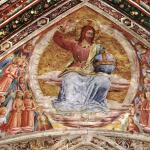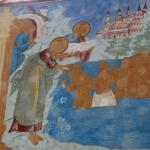
Scripture is full of examples of those who were promised great things by God and yet found their lives to be full of struggles. Their difficulties, or the struggles of those around them, often had them wrestling with God. Some, like Job, felt as if God had abandoned them and so they wrestled with God in order to try to make sense of their experiences. Others wrestled with God so as to find God’s mercy, if not for themselves, than for others. We can see this in the way Moses argued with God so that God would not obliterate the people of Israel (cf. Ex. 32:9-14). Scripture shows us that God gave various responses to such inquiries: what response Job received differed from the way God responded to Moses. God gave more to Moses than Job because Moses was concerned not only for himself, but for others. Indeed, Scripture often suggests that God will give more to those who search for and fight for the rights of others than those who only look for and seek for some good for themselves.
God wants us to be so concerned with others that we will be willing to fight for their needs; God wants to draw us out of ourselves, so that we no longer are self-centered. Our lamentations, our cries to God, when they come out of love, a love which looks beyond ourselves but for others, is a higher kind of wrestling with God than when all we are concerned about is ourselves and our own wants and needs.
God must not be seen as some sort of genie who will grant us our every wish, our every desire. This is not because God cannot and will not help us, but because God truly desires to help us, which means, God has made room for us to act and reaction, to make mistakes and learn from them. God does not want us to be overly reliant upon divine intervention God want us to grow, to make sure we do not become slothful, expecting God to do all those things for us which we can and should do ourselves. Indeed, if everything was simply given to us, we would find our lives would be worthless, as there would be little to no meaning to our actions. However, this does not mean God leaves us without any help; how much help we get and what kind it is seems to be dictated by many variables, too many for us to know and understand this side of the eschaton.
What we must realize is that we need our own space so that we can truly do meaningful actions in the world. Through what we do, we develop ourselves and our relationships with others, including God. For what we do with that space, what we focus on in that space, will be reflected in our relationships; will we take the opportunity given to us and become more like Job, aiming to do what is just but still focusing on ourselves, or will we become like Moses, looking after and being more concerned about others than our own well-being? In truth, the more we grow, the more we develop our relationships, it is likely we will become more and more like Moses. This is because the more we wrestle with God, the more we will find God’s actions help develop and shape us to become more loving, reflecting the image and likeness of God within us. This is exactly what we see happened with another Moses, St Moses the Ethiopian, who once was a runaway slave turned brigand acting only for his own benefit, but later became a Christian, a monk, and a holy man whose focus was on transforming himself so that he could become a man who took care of others more than himself.
Many of the stories and sayings connected to Moses the Ethiopian show us one of the many ways this transformation took effect in his life. We can see this, for example, in the way Moses thought mercy should be shown to all because of the mercy he once received. We also see this in the way he came to believe God would take care of others in and through his own work in the world, and if it appeared God was not doing so, Moses would wrestle with God to make sure God would do so:
It was said of Abba Moses at Scetis that when he had arranged to go to Petra, he grew tired in the course of his journey and said to himself: ‘How can I find the water I need there?’ Then a voice said to him, ‘Go, and do not be anxious about anything.’ So he went. Some Fathers came to see him and he had only a small bottle of water. He used it all up in the cooking of lentils for them. The old man was worried, so he went in and came out of his cell, and he prayed to God, and a cloud of rain came to Petra and filled all the cisterns. After this, the visitors said to the old man, ‘Tell us why you went in and out?’ The old man said to them, ‘I was arguing with God, saying “you brought me here and now I have no water for your servants.” This is why I was going in and out; I was going on at God till he sent us some water.’[1]
God loves us and wants the best for us. This sometimes is hard for us to realize because we have often been given a bad representation of who God is, one in which God appears to be a tyrant looking for any excuse to condemn us. But part of what is best for us can be difficult for us to understand because it means making room for us to act as we should wish. God loves us like a parent, and for this reason, seeks to give us our own agency. As we are given space to develop ourselves, to grow, we should grow in love, and when we do so, our growth will lead us to becoming concerned more about others than ourselves. Our engagement with God, our wrestling with God, will reflect much about us and how much we have or have not grown.
The more agency we have been given in the world, the more we will find that it has been given to us so that we can and should do what we can for the good of others. While we can and should pray for them, we should not think that frees us from doing our part to help them as well. Thus St. Moses the Ethiopian cooked lentils, giving what he had made to those who were in need. God provided what Moses could not, that is God, provided Moses with the water he needed, but without Moses using it to cook the lentils, the water would not have been enough to provide for the welfare of those who were with Moses. Likewise, we too must make sure we act with what is given to us, and use it for the greater good. If we grow in charity, and so in grace, we will find we will truly be able to move mountains, and extraordinary things will be done even in and through simple actions (like cooking lentils). But this will not happen if we become complacent, if we just accept things as they are, or how they were in the past; we must wrestle for positive change. When we do so, we will find how we wrestle with God will also change so that we will find ourselves no longer contending with God, but rather, we will find God is at our side, adding the strength and power of the divinity to our actions, so that we truly will make a difference in the world.
[1] The Sayings of the Desert Fathers. Trans. Benedicta Ward (Kalamazoo, MI: Cistercian Publications, 1984), 141 [Saying of Abba Moses 13].
Stay in touch! Like A Little Bit of Nothing on Facebook.
If you liked what you read, please consider sharing it with your friends and family!













